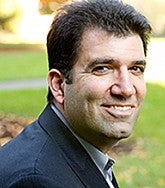
Theatre Arts
mnajjar@uoregon.edu | 541-346-2237
Courses: Theatre History, Middle Eastern Theatre, Israeli-Palestinian Theatre
In my courses you will:
- Practice foundational, transferrable skills.
- Interact during exciting, participatory class meetings.
I was invited into the Teaching Academy because:
- I was a member of the Working Group on Inclusive and Intercultural Teaching.
- I was a Fellow in the Teaching Difference, Inequality, Agency CAIT Group.
In what ways are you working to make your teaching inclusive?
I am always striving to make my teaching more inclusive by using course materials that are more expansive, working to learn and understand my students' goals for learning and working to connect course content to those goals, and to motivate my students to understand the necessity of the course material to their own lives. These are just a few ways I am striving to achieve inclusivity.
What do you do in terms of professional engagement with the teaching and learning culture on campus or nationally?
I attend national conferences and make it a point to attend seminars that focus on pedagogy. I also attempt to read more about the role of universities in our national conversation about the role of education in the United States. I plan to attend more workshops that focus on teaching and learning throughout my career as a professor.
In what ways was your teaching in this course research-led—informed by research on how students learn and inflected by UO's research mission?
One of the ways I included research-led materials is by working on plays last year by playwrights who are actively engaged in writing about the Israeli-Palestinian conflict, co-editing a collection of those plays and writing introductions and prefaces to the plays, then having students read the plays and Skyping with all of the playwrights all term long. In this way I am actively connecting my research into this field with my pedagogy and my students have told me this has been a valuable addition to the classroom experience.
Where do you find inspiration?
I believe that the theatre has an indirect way of changing our world. Many of the plays I direct and write about in my critical work are by what I call "playwrights of conscience." What I mean by this term is that these are playwrights that do not focus on "entertainment" but rather on creating works that have a direct focus on the pressing issues facing our world today. These issues include how to create peaceful interactions between conflicting groups, how to build empathy in conflict zones, how to create dialogue in spaces where little or no dialogue exists, and how to use the theatre to change our world for the better. These are lofty goals but these playwrights are committed to this mission despite not being widely produced or accepted by mainstream theatres. This kind of work inspires me most because I believe that it is necessary theatre that can instigate change in our world. This inspires me as a theatre maker and as a professor of theatre, and I hope it continues to inspire my students as well.
